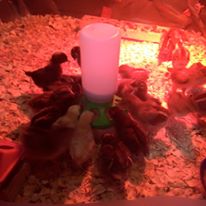With chick season right around the corner, I figured it would be a good time to talk about common chick illnesses. When it comes to chicks, the most important variable is timing. One moment they seem absolutely fine and the next they have perished. So, let’s get right into the nitty-gritty. Many illnesses are completely preventable with the use of vaccinations. Other key factors include cleanliness and having a great preventive care plan. You need to have a chick medicine kit of sorts, so you have what you need when it’s needed. Protect your investment by doing a ton of research and be prepared.
Pasty Butt
Takes place when their droppings stick to their down feathers surrounding the vent. The blockage can become fatal if not tended to quickly. The best option here is prevention, wipe their little bottoms daily with unscented baby wipes. If a clog does harden never pull it off! You will tear and further injure the chick. Dip the little one’s bottom in warm water till you can easily loosen and remove the blockage. Make sure to fully dry the chick before placing it back into the brooder.
Coccidiosis
A condition caused by microscopic parasites called coccidian. The exposure to infected chickens is to blame for it spreading. The chicks will appear pale and lethargic as well as have a sudden weight loss or failure to thrive. When more than one chick is infected you will find them huddled together as if they were cold. The best defense is a good offense, vaccinate chicks right away or have your hatchery vaccinate them. Starter medication can be used in lieu of vaccinations. Never have them vaccinated and place on a medicated feed: one treatment cancels out the other form.
It is important that you clean and sanitize your brooders, drinkers, and feeders before you place a new clutch of chicks in. Keep the brooder dry and clean at all times; change out bedding daily if possible. Fresh water and food should be changed out daily with sanitizing cleanses at the same time. I always say only put enough food and water for one day at a time so you remember to clean and refill daily. Now if they do become infected, there’re medicines available, but you need to catch it quickly for any chance of recovery.
Marek’s Disease
Preventing with proper vaccinations is the only choice. The virus is highly contagious and will wipe out an entire flock in days. It is caused by a strain of the herpes virus; it is spread through the chicken’s dander, and survives for up to a year in exposed areas. If it hits your flock, wait a year before replacing the flock. The other option is to change their location, coop, feeders, and drinkers entirely. There is no cure, the only choice is to vaccinate. Ask your preferred hatchery to perform the vaccination before pickup/delivery.
Bronchitis
A nasty little virus that is extremely contagious. The infection normally lasts for one to two weeks. The younger the chicks, the deadlier the flock’s outcome will be. Vaccinations are available by some hatcheries or purchase online to administer yourself. Symptoms can include coughing, sneezing, sleepiness, and/or appearing lethargic.
Failure to thrive
Symptoms include weakness, being small in size and/or underweight, and inactivity. Caused by nutritional issues, inexperienced chick keepers, infection, illness, or genetic imperfection. To treat the condition give as many fluids as possible, electrolytes, probiotics, and plenty of heat.
Now you have spent all the time and money to acquire the little fluffy butts so let’s protect them. The most important thing to have on hand is a good emergency kit. When it comes to young chicks they get ill fast you will not always have time to run the store. Keep on a hand a few essential items to ensure timely care. Include the following in your kit: electrolytes (Manna Pro has a pill form that is perfect, one pill per gallon of water), probiotics (small single-dose packets, one pack per gallon of water), syringe (for hand watering or dispensing medication), Amprolium (to treat Coccidiosis), and baby wipes (for pasty butt non-scented preferred).
Follow Carrie on her website, Facebook, and Instagram.














